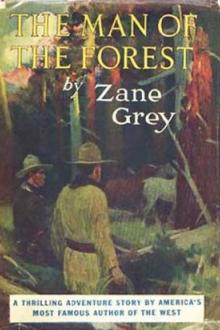The Man of the Forest by Zane Grey (read me like a book txt) 📗

- Author: Zane Grey
Book online «The Man of the Forest by Zane Grey (read me like a book txt) 📗». Author Zane Grey
It was a long gaze Wilson rested upon Riggs—as strange and secretive as the forest wind moaning down the great aisles—and when that dark gaze was withdrawn Wilson stalked away to make his bed with the stride of one ill whom spirit had liberated force.
He laid his saddle in front of the spruce shelter where the girl had entered, and his tarpaulin and blankets likewise and then wearily stretched his long length to rest.
The camp-fire blazed up, showing the exquisite green and brown-flecked festooning of the spruce branches, symmetrical and perfect, yet so irregular, and then it burned out and died down, leaving all in the dim gray starlight. The horses were not moving around; the moan of night wind had grown fainter; the low hum of insects was dying away; even the tinkle of the brook had diminished. And that growth toward absolute silence continued, yet absolute silence was never attained. Life abided in the forest; only it had changed its form for the dark hours.
Anson's gang did not bestir themselves at the usual early sunrise hour common to all woodsmen, hunters, or outlaws, to whom the break of day was welcome. These companions—Anson and Riggs included—might have hated to see the dawn come. It meant only another meager meal, then the weary packing and the long, long ride to nowhere in particular, and another meager meal—all toiled for without even the necessities of satisfactory living, and assuredly without the thrilling hopes that made their life significant, and certainly with a growing sense of approaching calamity.
The outlaw leader rose surly and cross-grained. He had to boot Burt to drive him out for the horses. Riggs followed him. Shady Jones did nothing except grumble. Wilson, by common consent, always made the sour-dough bread, and he was slow about it this morning. Anson and Moze did the rest of the work, without alacrity. The girl did not appear.
“Is she dead?” growled Anson.
“No, she ain't,” replied Wilson, looking up. “She's sleepin'. Let her sleep. She'd shore be a sight better off if she was daid.”
“A-huh! So would all of this hyar outfit,” was Anson's response.
“Wal, Sna-ake, I shore reckon we'll all be thet there soon,” drawled Wilson, in his familiar cool and irritating tone that said so much more than the content of the words.
Anson did not address the Texas member of his party again.
Burt rode bareback into camp, driving half the number of the horses; Riggs followed shortly with several more. But three were missed, one of them being Anson's favorite. He would not have budged without that horse. During breakfast he growled about his lazy men, and after the meal tried to urge them off. Riggs went unwillingly. Burt refused to go at all.
“Nix. I footed them hills all I'm a-goin' to,” he said. “An' from now on I rustle my own hoss.”
The leader glared his reception of this opposition. Perhaps his sense of fairness actuated him once more, for he ordered Shady and Moze out to do their share.
“Jim, you're the best tracker in this outfit. Suppose you go,” suggested Anson. “You allus used to be the first one off.”
“Times has changed, Snake,” was the imperturbable reply.
“Wal, won't you go?” demanded the leader, impatiently.
“I shore won't.”
Wilson did not look or intimate in any way that he would not leave the girl in camp with one or any or all of Anson's gang, but the truth was as significant as if he had shouted it. The slow-thinking Moze gave Wilson a sinister look.
“Boss, ain't it funny how a pretty wench—?” began Shady Jones, sarcastically.
“Shut up, you fool!” broke in Anson. “Come on, I'll help rustle them hosses.”
After they had gone Burt took his rifle and strolled off into the forest. Then the girl appeared. Her hair was down, her face pale, with dark shadows. She asked for water to wash her face. Wilson pointed to the brook, and as she walked slowly toward it he took a comb and a clean scarf from his pack and carried them to her.
Upon her return to the camp-fire she looked very different with her hair arranged and the red stains in her cheeks.
“Miss, air you hungry?” asked Wilson.
“Yes, I am,” she replied.
He helped her to portions of bread, venison and gravy, and a cup of coffee. Evidently she relished the meat, but she had to force down the rest.
“Where are they all?” she asked.
“Rustlin' the hosses.”
Probably she divined that he did not want to talk, for the fleeting glance she gave him attested to a thought that his voice or demeanor had changed. Presently she sought a seat under the aspen-tree, out of the sun, and the smoke continually blowing in her face; and there she stayed, a forlorn little figure, for all the resolute lips and defiant eyes.
The Texan paced to and fro beside the camp-fire with bent head, and hands locked behind him. But for the swinging gun he would have resembled a lanky farmer, coatless and hatless, with his brown vest open, his trousers stuck in the top of the high boots.
And neither he nor the girl changed their positions relatively for a long time. At length, however, after peering into the woods, and listening, he remarked to the girl that he would be back in a moment, and then walked off around the spruces.
No sooner had he disappeared—in fact, so quickly after-ward that it presupposed design instead of accident—than Riggs came running from the opposite side of the glade. He ran straight to the girl, who sprang to her feet.
“I hid—two of the—horses,” he panted, husky with excitement. “I'll take—two saddles. You grab some grub. We'll run for it.”
“No,” she cried, stepping back.
“But it's not safe—for us—here,” he said, hurriedly, glancing all around. “I'll take you—home. I swear.... Not safe—I tell you—this gang's after me. Hurry!”
He laid hold of two saddles, one with each hand. The moment had reddened his face, brightened his eyes, made his action strong.





Comments (0)